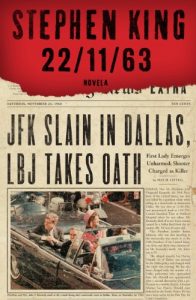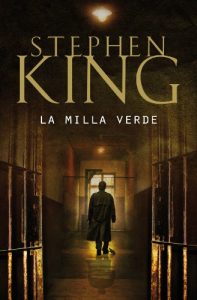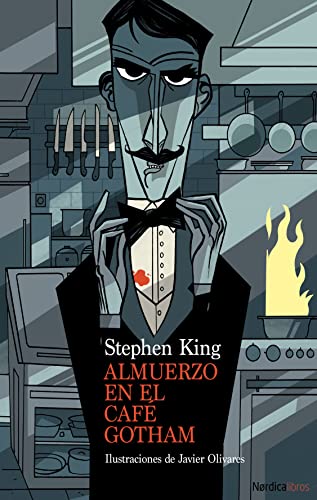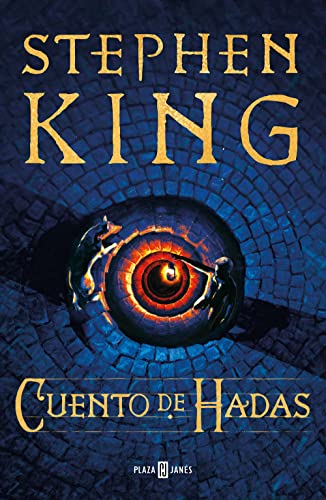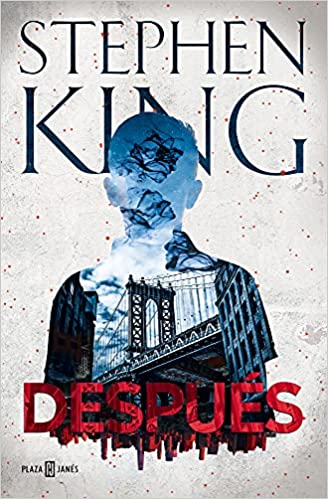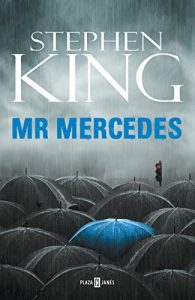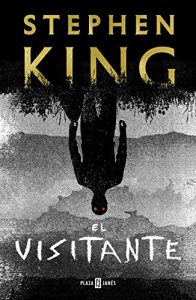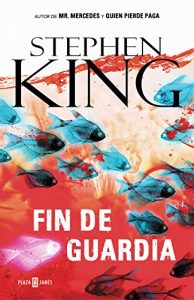Expand on the reasons for considering Stephen King As the writer who marked me in my eternal vocation for writing, he could take me pages and pages of a great book.
Making at least a small point in this regard, I would like to point out my appreciation that the final step towards writing is always due to an inspiring point of the most unexpected, something that ends up leading you to tell your first story and to that discovery that the meet your imagination.
In my case, the idea of writing my own stories arose largely as I discovered the characters that Stephen King he created in his novels. Beyond the themes of his hundreds of works (horror on some occasions but also sinister mysteries and disconcerting plots in many others), beyond all that, we can stay with the elaboration of his characters.
The implausible becomes close thanks to that life that oozes between the pages, that constant wink towards empathy, that human proximity towards the absolute internalization of each character, it seems to me something unmatched by any other writer. Even in the little known books of Stephen King we enjoy that constant in his ability to invent characters.
And already focusing on the idea of exalting his three most masterpieces, the three best novels of his vast literary production, I put aside all those first diffuse ideas about my narrative vocation and get to it. Difficult completely agrees with me. It is impossible that, at least, you will not be fascinated by the selection...
Top 3 recommended novels of Stephen King
The dead zone
From an accident suffered by the protagonist, John Smith, which kept him in a coma for years, we discover that in his transition between life and death he returns with some type of active connection with the future.
His brain, damaged in the blow, houses a mind that in its proximity to the afterlife has returned with extraordinary powers of prediction.
John is an ordinary guy, someone who, after being embraced by death, just wants to take advantage of the moments of his life. Among the most personal plot of an anonymous guy who Stephen King It makes you feel very close, as if it could be you, we are getting closer to that ability to predict.
John deciphers the destiny of the wills that shake his hand, or that touch him, his mind connects with the future and presents what is going to happen. Thanks to this ability, he knows of a sinister fate that awaits them all if a politician he greets reaches power. You must act immediately.
Meanwhile his life goes on and we hooked up with the lost love, with the aftermath of the accident. John is a very human guy who arouses great emotion. The conjunction of that personal aspect with the fantasy of his capacity and the necessary action to avoid a sinister future turn the novel into something special. Fantasy, yes, but with large doses of fascinating realism.
22/11/63
The name of the novel is the date of a momentous event in world history, the day of Kennedy's assassination in Dallas. Much has been written about the assassination, about the possibility that the defendant was not the one who killed the president, about hidden wills and hidden interests that sought to remove the American president.
King does not join the conspiracy slopes that point to causes and murderers different from what was said at the time. He only talks about a small bar where the protagonist usually has a coffee.
Until one day his owner tells him about something strange, about a place in the pantry where he can travel to the past. Sounds like a strange argument, pilgrim, right? The grace is that the good of Stephen makes perfectly credible, through that narrative naturalness, any entry approach.
The protagonist ends up crossing the threshold that leads him to the past. He comes and goes a few times ... until he sets a final goal of his travels, to try to prevent the Kennedy assassination. Einstein already said, time travel is possible.
But what the wise scientist did not say is that time travel takes its toll, causes personal and general consequences. The attraction of this story is to know if Jacob Epping, the protagonist, manages to avoid the assassination and discover what effects this transit from here to there has.
Meanwhile, with the unique narrative of King, Jacob is discovering a new life in that past. Go through one more and discover that you like that Jacob more than the one from the future.
But the past in which he seems determined to live knows that he does not belong to that moment, and time is merciless, also for those who travel through it. What will become of Kennedy? What will become of Jacob? What will become of the future? ...
The green Mile
Surely this story is remembered more for his film than for his book. But, although the film is masterfully executed, with fidelity and integration in the script incredibly adjusted to the novel, there are always aspects that the cinema cannot replicate. Sensations of reading, impressions, scenarios imagined in that 3D of our brain…
The story is narrated by Paul Edgecomb, a resident of a nursing home, to Elaine connelly, one of his companions who lives there. He is a former prison official in charge of the Block E from the prison of Cold Mountain, in the state of Louisiana, the block of those sentenced to death, which unlike other prisons, was not called «The final mile"But, because of its lackluster lime-colored linoleum floor, it was nicknamed"The green Mile«.
One day a tall, muscular African-American named John coffey, accused of the rape and murder of the twins Cora y Kathe twelve years. At first everyone believes him guilty; but, soon, strange events take place to throw puzzling doubts.
Coffey, in addition to being an apparent psychic handicap, turns out to have certain healing powers, which are manifested for the first time when he heals Paul from a urinary infection that was driving him crazy. Coffey, after each cure, expels the evil from his body vomiting it in the form of insects similar to black moths that turn white until they disappear.
Despite my immense appreciation for all the work of this author, these three are without a doubt for me, those three essential books of Stephen King. I am sure that reading any of them would add a staunch reader. Long life to Stephen King!
Other interesting books by Stephen King...
Despair
It was just a town lost in the middle of Nevada, where Interstate 50 passes because some highway had to. A remote town existing thanks to some mine that once guaranteed some sustenance. Excavations in question and with their black legends in tow.
Something that we would never know if the travelers passing by had not had to make a mandatory stop. A desert town to look at from the corner of your eye between yawns as Interstate 50 reaches its endless horizon.
But the strange policeman was there to stop everyone who passed through the area. Everyone goes to jail under the most unexpected sanctions. A sinister police officer with a last name Entragian in which we already detect strange, very dark, absolutely terrifying tics...
Little by little we are getting to know the unfortunate travelers with a stop and inn in Desesperación. And with them we suffer the tragic rage of Entragian, a guy who seems to have come from hell to take the lives of everyone who crosses his path.
The question is how Stephen King He traces different links between characters who begin to shine, such as the boy, David, and his particular relationship with God, or the writer back from everything about to become Saint Paul when he falls from his horse and sees the light.
Because that, light, is what they need to get out of a hellish encounter alive. And we already know that hell is underground. Hence, the mine and its byproducts gradually acquire absolute weight in the plot. Legends of miners and disasters that open up to us in their greatest crudeness. Beings that await their revenge and long to spread throughout all the bodies of the world to make the surface the same hell that rules the rocks within...
Lunch at Gotham Cafe
Daring to illustrate the imaginary of Stephen King has a lot of daring. But if any work had to be, nothing better than this strange and deranged story, as a capture of that comic where moments stop using an illustration that takes everything out of the blue, that suspends it in limbo, more than ever between reality and fiction.
A man named Steve Davis comes home one day to find a letter from his wife, Diane, coldly telling him that she is leaving him and intends to divorce. Diane's departure prompts him to quit smoking, and he begins to suffer from nicotine withdrawal. Diane's lawyer, William Humboldt, calls Steve with plans to meet the two for lunch. He decides on Cafe Gotham and sets a date. The protagonist's desperation for a cigarette and his ex is almost unbearable, but nothing compared to the horrors that await him in the trendy Manhattan restaurant.
Fairy tale
The thing about the thresholds with a visa to parallel worlds always brings me back to that great novel that for me was 22/11/63... It's not at all strange in Stephen King pull parallel spaces that advance through the dark cosmos with their tangential encounters. Fantasy with dark overtones that on this occasion also connects with childhood as a starting point. Only that King makes sure that it is not a children's story at all. Or rather he is able to return to where we all left what we were, waiting to return to inhabit warm and candid souls, the only ones capable of surviving when the cold comes...
Charlie Reade looks like an ordinary high school student, but he carries a heavy weight on his shoulders. When he was only ten years old, his mother was the victim of a hit-and-run and grief drove his father to drink. Even though he was too young, Charlie had to learn to take care of himself… and also to take care of his father.
Now seventeen, Charlie finds two unexpected friends: a dog named Radar and Howard Bowditch, her elderly owner. Mr. Bowditch is a hermit who lives on a huge hill, in a huge house with a tight-fitting shed in the backyard. Sometimes strange sounds emerge from it.
As Charlie runs errands for Mr. Bowditch, he and Radar become inseparable. When the old man passes away, he leaves the boy a cassette tape containing an incredible story and the great secret that Bowditch has kept all his life: inside his shed there is a portal that leads to another world.
After
One of those novels in which Stephen King he once again confirms the differential fact that separates him from any other author, a kind of verisimilitude of the extraordinary. Getting to blend in with the exceptional, with the extrasensory, is like once again convincing ourselves of a world such as we saw it as children, even if it is to disturb us or even to scare us.
No one else is capable of such narrative precision towards the hypnotic. People (more than characters) who are so natural and precisely outlined can make us believe that they fly instead of walking and also convince us that this is normal. From there everything else is sewing and singing. Even if we have to adjust to little Jamie's psyche, with that childlike point of "The Sixth Sense," King does it with that strange ability of his.
A child who sees the dead, yes. But what could he not tell us Stephen King without convincing us of its most absolute rigor and realism? In this novel that "After" is the step after the farewells that no one would want to experience. The goodbyes that only a child can do disguised as imaginative until later. All peppered with settings as friendly as they are spooky. Close, friendly, open sensations around the madness itself, as from the first session of therapy or exorcism.
That's when King has beaten our pulse to make us go through normality made paranormal, through the dilemmas of those people charged with the significance of the marked difference between mediocrity, gift or condemnation ...
This is how a short novel feels, intense and with the most unexpected twist as a prelude to an ending that, otherwise, remained a soulless point. This is how a writer of the fantastic ends up splashing with realism from a strangeness that crushes souls in search of essential emotions fiercely faced, from horror to deep emotion. Nothing new about the master except the warm surprise of your assured enjoyment.
Jamie Conklin, the only child of a single mother, just wants to have a normal childhood. However, he was born with a supernatural ability that his mother urges him to keep secret and that allows him to see what no one can and learn what the rest of the world ignores. When an inspector with the New York Police Department forces him to avoid the latest attack by an assassin who threatens to continue attacking even from the grave, it won't take long for Jamie to discover that the price he must pay for his power may be too high.
After es Stephen King In its purest form, a disturbing and emotional novel about lost innocence and the tests that must be overcome to differentiate good from evil. Debtor of the great classic of the author It (That), After is a powerful, terrifying and unforgettable tale about the need to stand up to evil in all its forms.
Gwendy's button box
What would Maine be without Stephen King? Or maybe it really is that Stephen King owes much of its inspiration to Maine. Be that as it may, the telluric acquires a special dimension in this literary tandem that goes far beyond the reality of one of the most recommended states to live in the United States.
Nothing better to start writing than to take references from the closest reality to end up orienting what you have to tell towards a realistic or critical projection or to transform everything, inviting the reader to take a tour of everyday corners on this side of the world; convincing the reader that dark abysses are hidden behind the trompe l'oeil of literature.
And this time it is Maine again where King (co-authored with the unknown to me Richard Chizmar), locates us to live a story that delves into terror from that incomparable subjective perception of characters that end up invading our soul, with black magic of the author's narrative.
Lights and shadows of a young woman named Gwendy (naive evocation in the name to create a greater paradoxical sensation, in the style of her short novel «The Girl Who Loved Tom Gordon«), In a quiet and helpless space between Castle View and Castle Rock.
What leads Gwendy every day to move from one side to the other down the stairs of suicides will end up bringing us closer to the most sinister approach to fate, about our decisions and about the fragility to which fear can lead us.
A disturbing figure, as in so many other novels by Stephen King. The man in black who seemed to be waiting for her at the top of the hill where the stairs end. His wake-up call that reaches her like a whisper slipped between the currents that move the leaves of the trees. Perhaps it is that Gwendy chose that path because she expected that encounter that would mark her life.
The guy's invitation to have a relaxed conversation will end up leading to a gift from the man in black. And Gwendy will discover how to use it to her advantage.
Of course, young Gwendy may end up taking advantage of the great use of the gift without the necessary maturity. And it is true that certain dark gifts do not end up bringing anything good, nor can they help Gwendy escape the great emotional battles that life has in store for her ...
As for Castle Rock and its inhabitants, from that moment on we plunge into the grim mystery of inexplicable events for the bewildered and fearful locals. Events about which Gwendy has unfailing clues that give a thorough explanation to everything and that will haunt her until many years later.
Mr mercedes
When retired police officer Hodges receives a letter from the mass murderer who took the lives of dozens of people, without ever having been arrested, he knows that it is undoubtedly him. It's no joke, that psychopath throws him that letter of introduction and offers him a chat with which to "exchange impressions."
Hodges soon discovers that the murderer stalks him, observes him, knows his routines, and apparently just wants him to end up committing suicide. But what happens is just the opposite, Hodges rejuvenates at the idea of closing the old case of the murderer known as Mr. Mercedes, who ran over dozens of people who were queuing to get a job.
At the same time we meet Brady Hartsfield, an intelligent and moonlighting young man. Ice cream seller, computer technician and psychopath hidden in the basement of his house. It is curious how, in some way, we find a justification for his criminal performance, or at least that seems to follow from the development of his personal background. A dead father accidentally electrocuted, a dependent psychically handicapped brother who absorbs his life and that of his mother, and a mother who in the end gives herself fiercely to alcohol after the death of the least gifted of her children.
Brady and Hodges engage in a chase, in a conversation on the net during which both are throwing their baits. Until the conversation gets out of hand and the actions of both announce an explosive development.
While Hodges takes up the case of Mr Mercedes, his life, which seemed doomed to a dark end mired in depression, acquires an unknown vitality, between the family of one of the victims of Mr Mercedes finds a new love, and Brady (Mr Mercedes) he can't bear that what was going to be a plan to destroy the cop ends up being an offer to his happiness.
Madness approaches Brady then fiercely, he is ready for anything. And only the possible intervention of Hodges, fiercely punished by Brady in his nascent happiness, can stop him before he commits his greatest folly. Thousands of people are at imminent risk.
The truth is that, recognizing the mastery of one of my literary references, this novel does not seem to me to be as good as so many others. The plot progresses agile but there is not that level of depth with the characters. Either way it is entertaining.
The visitor
A story that demonstrates that versatility of the Portland genius that longtime fans have already enjoyed since he caught us for his cause.
Because although it is true that in the pages of The Visitor you can enjoy that author who outlines characters brimming with naturalness in the midst of disturbing environments, on this occasion King disguises himself as a writer of black genre with a point of investigation from the forensic point of view; in the style of the crime novels deeper into the psychological thriller, the crime dramatized by a disturbed mind capable of anything.
Nothing worse (or better to prop up the macabre aspect of a story starter) than discovering a dead child after subjecting him to unimaginable brutality. As often happens in real life, the figure of the suspect located in the friendly part of the world, ends up misplacing everyone.
Because Terry was a great guy. Yes, the kind that greets with a smile that cuts off his relaxed whistle, while grasping his daughters with his big hands ... But the physical signs are clear, due to many excuses, alibis and uncompromising defenses of the last inhabitants with the faith of Flint. City.
The task of a detective always supposes the unraveling of the truth, a truth that, coming from the hand of Stephen King point to some twist that ends up gaping you, certainly shocked.
The heinous guilt of a capital crime and sin that rouses and convulses the entire society of Flint City leads Detective Ralph Anderson to a degree of caution, meticulousness and scruples that is practically impossible in the face of the virulence of the case.
Perhaps only he, with that necessary concession to innocence, can end up discovering something. Or maybe once you have entered the depths of the case of the impossible murderer Terry Maitland, you end up reaching the crudest of truths, the one that turns evil into a current capable of sliding from soul to soul, with the idea that everything supernatural was only the thing of a devil at the controls of this world.
End of watch
I must admit that to get to this third part I have skipped the second. But that's the way the readings are, they come as they come. Although there might really be another motivation behind it. And it is that when I read Mr mercedes I had a certain uncomfortable aftertaste.
Surely it would be because when one has read much of the work of Stephen King he always expects masterpieces, and Mr Mercedes did not seem to me to be on a par with previous ones. Which I also find interesting because it makes Stephen King in human, with its imperfections 🙂
However, come to this sequel, with the jump of the indicated intermediate novel Whoever loses pays, I find more sense to that kind of reserve in which Mr Mercedes moved. The good thing is always better to leave it for the end, of a lifetime.
Bill Hodges is no longer that recovered investigator for the cause since his traumatic retirement from the police force. With the passage of time addressed in the saga, he supports on his shoulders and on his conscience everything bad that happened, all the pain ruminated by unbearable losses.
So, in the face of our diminished hero, the idea that his antagonist from the series Brady Hartsfield acquires a special strength, obtained in that kind of lethargy in the Hospital where he fell into a coma, sometimes becomes devastating for him. good about Hodges. Because he will be your main target.
Most disturbing of all is how Brady manages to return to the scene by remaining bedridden. And it is that, turned into a guinea pig on which to proceed with certain very special drugs, our dark antagonist accesses infinite possibilities with which to proceed to his revenge, first resuming his communication with a bewildered Bill Hodges.
Brady knew how to drive anyone to insanity and suicide. His forms of harassment seen in the first part acquire in this final sequel a much more sinister air, thus recovering the spirit of other works by the master on the supernatural and its pernicious effects ...
The Girl Who Loved Tom Gordon
There are short novels that leave you with a more ephemeral taste and others like this one that in their brevity awaken intense aromas (yes, yes, like an advertisement for coffee itself).
The point is that the fact that little Trisha gets lost in the forest is soon, in the hands of the teacher, a cluster of sensations of freezing humidity, darkness and threatening noises. Like when we ourselves lose step with the rest of the group in a forest.
At first, the reencounter with nature is pleasant. But we immediately ran off to regain contact with the real world, with our own. Because there, in the middle of the forest, there is a world that no longer belongs to us.
Trisha also knows that this is not her place. Her brain, instead of helping her to orient herself, takes her into the terrible spiral of fear enhanced by reason about to let go of the controls.
A little novel to read in two sittings (or in one if you have enough time because there is no desire to ...). A gem that shows that King is rather God to assemble a plot out of nothing, causing that nothing to spread like a whole abysmal universe.
Elevation
I bring up this other short novel to spark a contrast. It's not that Elevation is bad, it has more to do with what is always expected of genius. Stephen King.
This time that Stephen King convinced of the moralizing aspect of fiction, of the ability to extract chicha from fantastic musings. Because once an exciting story beats us, King is always capable of opening us up to great ideas from those almost childish emotions.
Scott Carey suffers from a strange effect of the ethereal. It seems as if every day I belong less to this world and aim for weightlessness. Its dematerialization is not visible to others, nobody is able to discover what the scale shows in an undoubted way. Scott is losing weight like the rest of the humans.
Like all strange phenomena, Scott suffers and fears. Only Dr. Ellis shares his strange "ailment", mostly on the basis of his Hippocratic oath.
Little by little Scott's new nature transcends everyday aspects of Castle Rock. And magically, among the sinister of the matter, the change points to an improvement in many areas ...
Undoubtedly Tim Burton would be delighted to bring a story like this to the cinema, as emotional as Eduardo Scissorhands or Big Fish with the addition of that special juice of dialogue, introspection in characters and descriptions that only King knows how to combine.
Between the fantasy story and the short novel, the future of Scott, and by extension the most mundane destiny and the transcendent pair of Castle Rock, knows little and in turn must be like that. Because deep down it is only about the most particular life of a new friend, marginalized by her social environment. But the new Scott, light as feathers, will be able to come to his aid and change everything ...
Scott's exhibition on body and soul is an enchanting moral, masterfully drawn with those brushstrokes that awaken from the brief and their suggestive endings, invitations and echoes that remain until many after having finished with the last page.
Goodbye Scott, have a good trip and don't forget to bundle up. Up there it must be fucking cold. But, at the end of the day it will be part of your mission, whatever it is.


